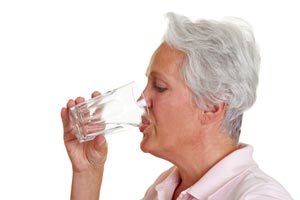Along with its many other benefits, drinking adequate water offers significant protection against heart problems, including strokes and heart attacks - even in those who have already experienced a stroke.
Although strokes are more common in the elderly population, stroke prevention can—and should—begin early in life.
Preventing Strokes
Studies have shown that people who are afflicted with heart disease and/or have previously suffered a stroke can reduce their risk of a future, fatal stroke by half just by keeping properly hydrated.
Studies have shown that people who are afflicted with heart disease and/or have previously suffered a stroke can reduce their risk of a future, fatal stroke by half just by keeping properly hydrated.
 Although an excellent, simple, preventative measure for everyone, it is of particular importance for those with, or at risk for, heart disease to consume a minimum of one cup of water for every 20 pounds of body weight daily.
Although an excellent, simple, preventative measure for everyone, it is of particular importance for those with, or at risk for, heart disease to consume a minimum of one cup of water for every 20 pounds of body weight daily.
It is most important to forego the morning cup of coffee in exchange for a mug or two of water.
This is the time of day when our bodies are most dehydrated, as we do not consume any water while we sleep, as it is important to increase hydration as quickly as possible.
A lack of water leads to thickening of the blood, making a stroke all the more likely.
Blood is at its thickest in the morning when we awake, a leading reason why strokes and heartattacks disproportionately occur in the morning.
Beverages like orange juice and coffee temporarily thicken the blood, so if you must drink something other than water, wait until your hydration has been fully restored later in the day.
Water and Stroke Onset/Recovery
A person who feels a stroke coming on should receive immediate medical attention.
A person who feels a stroke coming on should receive immediate medical attention.
Damage to brain cells (which are irreplaceable) begins as quickly as four minutes after the beginning of the stroke.
And in an attempt to restore oxygen flow to the brain, the body increases the size of the arteries around the area of the blockage.
 Being well hydrated is a benefit because the blood is thinner making it easier to pass oxygen around the blockage to the brain.
Being well hydrated is a benefit because the blood is thinner making it easier to pass oxygen around the blockage to the brain.
However this does not mean you should drink water at the onset of a stroke.
Some stroke conditions include hemorrhagic bleeding which may require immediate surgery and in these cases, it is better to not have water in the system to reduce the potential complication of aspiration under anesthesia.
To be safe, it is best to always check with a doctor or health care professional when it is okay to eat or drink again following a stroke.
Many stroke victims also experience difficulty swallowing and a dry mouth during their recovery.
 Although this usually subsides after a few weeks, it helps to take frequent small sips of water, or to use a spray bottle to keep the mouth moist.
Although this usually subsides after a few weeks, it helps to take frequent small sips of water, or to use a spray bottle to keep the mouth moist.
When it comes to your health, the quality of your drinking water is just as important as the quantity.
RELATED POSTS:
.
CLICK HERE . . .
CLICK HERE . . .
.
CLICK HERE . . .
http://puricare.blogspot.com/2017/02/congestive-heart-failure-congestive.html
.
PURICARE
INDUSTRIAL
ENTERPRISES
Water
Treatment
Systems












No comments:
Post a Comment